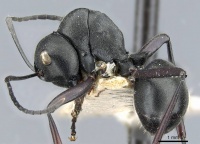Polyrhachis luctuosa
| Polyrhachis luctuosa | |
|---|---|

| |
| Scientific classification | |
| Kingdom: | Animalia |
| Phylum: | Arthropoda |
| Class: | Insecta |
| Order: | Hymenoptera |
| Family: | Formicidae |
| Subfamily: | Formicinae |
| Tribe: | Camponotini |
| Genus: | Polyrhachis |
| Subgenus: | Cyrtomyrma |
| Species: | P. luctuosa |
| Binomial name | |
| Polyrhachis luctuosa Emery, 1921 | |
Nothing is known about the biology of Polyrhachis luctuosa.
Identification
Polyrhachis luctuosa is closely related to Polyrhachis inflata, with both distinguished from all other known New Guinean species by the very closely reticulate-punctate sculpturation of their body, giving them a distinct, opaque appearance. However, Polyrhachis inflata is easily distinguished from Polyrhachis luctuosa by its exceptionally high pronotal dorsum which bears a well-defined, median, longitudinal furrow along its summit. The pronotum in Polyrhachis luctuosa is not swollen and has no furrow on its summit. (Kohout 2006)
Keys including this Species
Distribution
From Kohout (2006): Polyrhachis luctuosa is apparently very rare and, besides the type, only one additional specimen was collected by R.W. Taylor at Hayfield nr Maprik (East Sepik Prov., Papua New Guinea).
Distribution based on Regional Taxon Lists
Indo-Australian Region: New Guinea (type locality).
Distribution based on AntMaps
Distribution based on AntWeb specimens
Check data from AntWeb
Countries Occupied
| Number of countries occupied by this species based on AntWiki Regional Taxon Lists. In general, fewer countries occupied indicates a narrower range, while more countries indicates a more widespread species. |

|
Estimated Abundance
| Relative abundance based on number of AntMaps records per species (this species within the purple bar). Fewer records (to the left) indicates a less abundant/encountered species while more records (to the right) indicates more abundant/encountered species. |

|
Biology
Castes
Known only from the worker caste.
Nomenclature
The following information is derived from Barry Bolton's Online Catalogue of the Ants of the World.
- luctuosa. Polyrhachis (Cyrtomyrma) luctuosa Emery, 1921e: 25 (w.) NEW GUINEA. See also: Kohout, 2006b: 131.
Unless otherwise noted the text for the remainder of this section is reported from the publication that includes the original description.
Description
Worker
Noire, pattes tendant au roux, absolument mate, densement et finement ponctuee sur presque tout le corps et sur les membres; les mandibules, l'extremite et le dessous du gastre sont plus ou moins luisants. Pubescence tres courte et eparse. Des poils dresses blanchatres, courts, sont semes sur la tete et le gastre.
Pareille pour la forme du corps a P. rastellata, mais le corselet est encore plus court et plus bossu. Les dents laterales de l'ecaille ne sont guere plus longues que les mediales.
L. environ 6,5 mm.
Type Material
NEW GUINEA. Holotype worker. Museo Civico di Storia Naturale, Genoa - as reported by Kohout (2006).
References
- Emery, C. 1921e. Le genre Polyrhachis. Classification; espèces nouvelles ou critiques. Bull. Soc. Vaudoise Sci. Nat. 54: 17-25 (page 25, worker described)
- Kohout, R. J. 2006. Review of Polyrhachis (Cyrtomyrma) Forel (Hymenoptera: Formicidae: Formicinae) of Australia, Borneo, New Guinea and the Solomon Islands with descriptions of new species. Memoirs of the Queensland Museum. 52:87-146.
References based on Global Ant Biodiversity Informatics
- Emery C. 1921. Le genre Polyrhachis. Classification; espèces nouvelles ou critiques. Bulletin de la Société Vaudoise des Sciences Naturelles 54: 17-25.
- Janda M., G. D. Alpert, M. L. Borowiec, E. P. Economo, P. Klimes, E. Sarnat, and S. O. Shattuck. 2011. Cheklist of ants described and recorded from New Guinea and associated islands. Available on http://www.newguineants.org/. Accessed on 24th Feb. 2011.
- Kohout R.J. 2006. Review of Polyrhachis (Cyrtomyrma) Forel of Australia, Borneo, New Guinea and the Solomon Islands with descriptions of new species. Memoirs of the Queensland Museum 52: 87-146.

